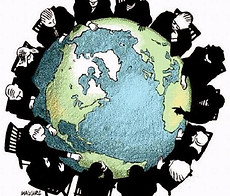WHICH IS THE DIFFERENCE?
DIPLOMACY
CONSUL vs AMBASSADOR
Here comes an important distinction that can be useful if you are travelling and you have a problem in a country abroad. You should look for help in one of these two places, the embassy or the consulate, but which one of them?
A consul is an official person of the foreign service whose main task is to assist the people of the country of origin he is currently representing in the foreign territory.
The processing and legalization of documents, the delivery of powers or certificates, the renewal of passports, the defence of citizens and the tourist, cultural and economic promotion of the nation are part of the activities that must be carried out. These activities take place at the consulate, which unlike the embassy, there could be more than one representing a country in the same territory.
The ambassador is responsible for ensuring the interests of his country in the territory where he is working. He acts as an intermediary between the two governments, representing his native country. There must be only one embassy as a permanent representation office, which is normally located in the capital of the receiving state.
Among its functions, he negotiates to strengthen political, economic and commercial relations between the two countries; informs the government of everything that happens in the place of destination; makes status visits, etc.
Hierarchically, the ambassador stands above the consul.
In addition, it is also possible to find a consular section in some embassies. The consulates have a lower category and there may be several in the same state, located mainly in the most important cities.
Regarding the main functions of each one, we can consider the embassy as a mediator for relations between the two countries.
For its part, the functions of the consulate are more related to citizen care, although citizens with administrative problems can also attend the embassy.


CONSULATE

“GOVERNANCE” vs GOVERNABILITY
As you can see in the title governance appears between quotation marks. This is because in English it is commonly used the same term to designate these two words.
Globalization, a new concept of the 21st century, has brought a new sphere in the international community that nowadays involves a huge amount of actors. Non-state actors such as new organizations, enterprises, and even the world population are taking part in the international sphere and influencing it. This supposes a new challenge for governments making it difficult for them to govern the countries appropriately.
In 1990 appeared the word “governance” implying a change in power relation among states and non-state actors. Due to globalization (since the fall of Berlin Wall in 1989) and the interconnected world, governments need to cooperate with other state and non-state actors in order to fulfil the current demands of its population. Mainly because its own country's population is currently influenced by the new global challenges such as climate change or the refugee crisis. Indeed, these new challenges cannot be solved by countries individually, so they need to cooperate among them through governance.
For governability, the state is the primary and most important actor in society. This concept is mainly related to the public sphere. It highlights the legitimacy and efficacy of the government while administrating society.
In that way, governability will determine the efficacy of the government, if a state is properly governed or not. While governance specifies a new way of doing politics globally, involving all the new actors that appear in the international sphere.


GOVERNANCE
GOVERNABILITY